Hotel Management System Development: Features, Tech, Cost, and More
Updated 13 Apr 2023
19 Min
7181 Views
Does this sound familiar? You’ve purchased a top-rated hotel management software, but it’s far from being great. Probably developers were trying to hit all user types, bringing lots of out-of-the-box solutions that you don’t actually need. Or quite the opposite – these are not the features you’re looking for. Finally, you may want to build a third-party app on top of it but face bugs or timeouts.
Instead, a custom hotel management system covers all business needs. Its functionality, design, and solutions work for specific hotels or hotel chains. So if existing software doesn’t meet the requirements, maybe it’s time to start creating your own.
In our article, we’re going to review the main functions of a hotel management system, explain what technologies are used to create a well-designed platform, and calculate the approximate development price. So if you’re thinking of giving fresh momentum to the hotel business or wondering how a hotel management system works – just keep reading.
What Is Meant By Hotel Management Software
The hotel management system (HMS) is a kind of hospitality software. It assists hotel owners in automating staff's daily tasks and simplifying the management of key hotel processes, including check-ins and check-outs. Moreover, HMSs also boost inventory and increase the number of short- and long-term bookings.
There are several main reasons why hotels and hotel chains think about hotel software development:
- The need to optimize hotel operations
- The desire to increase customer satisfaction
- Automation of front-desk operations
- Increase in popularity of technological solutions for hotel business, etc.
Hotel management applications for customers optimize costs, provide superior customer service and generate new revenue streams. Developing a hotel management system implies having the features necessary to manage a business in a global economy effectively. However, your venture's success will depend on the experience and competence of the selected IT provider.
Why Do Companies Need Hotel Software Development
Hotel management software development has a number of advantages, which will simplify business management and improve performance.
Optimizing operations
To perform all daily tasks, hotel personnel often must work in several applications simultaneously, constantly reconciling and transferring data. However, the modules of hotel management system projects interact with each other automatically to simplify and speed up all processes.
Protecting customer data
Since most HMSs are cloud-based, all your guests' data will be encrypted and securely stored in the cloud. This ensures third parties will protect them from both loss and interception.
Personalized services
With all data securely stored in the system, it will be easier for you to run various loyalty programs. For example, you can provide gift cards and store information about customer preferences. Also, HMS will allow you to create multilevel loyalty systems for all guests: from ordinary clients to VIPs.
Enhanced staff interaction
Hotel management system software allows employees to collaborate more effectively. The application can automate the distribution of tasks and send notifications with reminders of jobs for the day.
Better performance
Thanks to the capabilities of hotel management software, hoteliers can significantly reduce the cost of daily routines and increase the efficiency of all operations. Also, you can decrease the probability of errors caused by human error or inattention of personnel.
Increased revenue streams
HMS can increase guest satisfaction, open up additional marketing opportunities and help attract new customers. In this way, you can boost your income.
In addition to all the advantages of HMS, there are other reasons for hotel management software development.
Want to improve hotel management?
Our team will develop a custom hotel management system to help you optimize your daily tasks
Why Develop a Custom Hotel Management System?
The current market is filled with high-technological options in any industry, and hospitality is surely one of them. As more and more customers prefer to buy and book services online, hotel owners should be ready to cope with this type of customer activity.
Sure, depending on the kind of your hotel and the number of implemented features, the HMS may differ. Still, some solutions as hotel PMS (property management system), are rather a requirement. These systems are not simply targeted to make customer interactions more convenient but also to improve the working conditions of both managers and employees. Hotel management systems, with all their modern features, help to watch over everyday processes and ensure the quality of services your company provides.
Finally, hotel management systems are great for increasing client loyalty as they keep all the details about your guests and their preferences. It’s extremely important as your main goal for sure is increasing customer satisfaction.
After building a custom hotel management system, you get:
- Features developed to be applied according to the needs of a business, without any additional and not-required options (so you’re paying exactly for what you expect to see).
- Completely secure software that keeps customers’ personal and payment details protected. You don’t need to worry about information leaks or theft. Each bit of sensitive data is secured due to the best technological solutions.
- You can always ask developers to add other features as your business expands, so there’s no need to build another website from scratch.
- You don’t have to spend tons of time and money on teaching the staff. Ready-made solutions have many unnecessary features, and it’s hard to start working with such applications. And this is something you’ll never experience with custom software.
- Custom solution is easy to elaborate, it’s scalable and top functional. And if you want to build a third-party app on top, there will be no bugs or timeouts.
Key Modules of Hotel Management System Project
Complex management systems are typically split into modules depending on their role. So the number of hours developers spend to build your own CRM, as well as its total cost, depends on the modules and features that are filling them. Thus, if you’d like to develop a similar platform, the first thing to consider is hotel management software modules.
Hotel management system modules can be divided into four groups:
- Reservation operations
- Analysis/monitoring
- Housekeeping
- Customer relationship management
Modules handle basic and complex customer requests and monitor front-desk and back-office tasks.
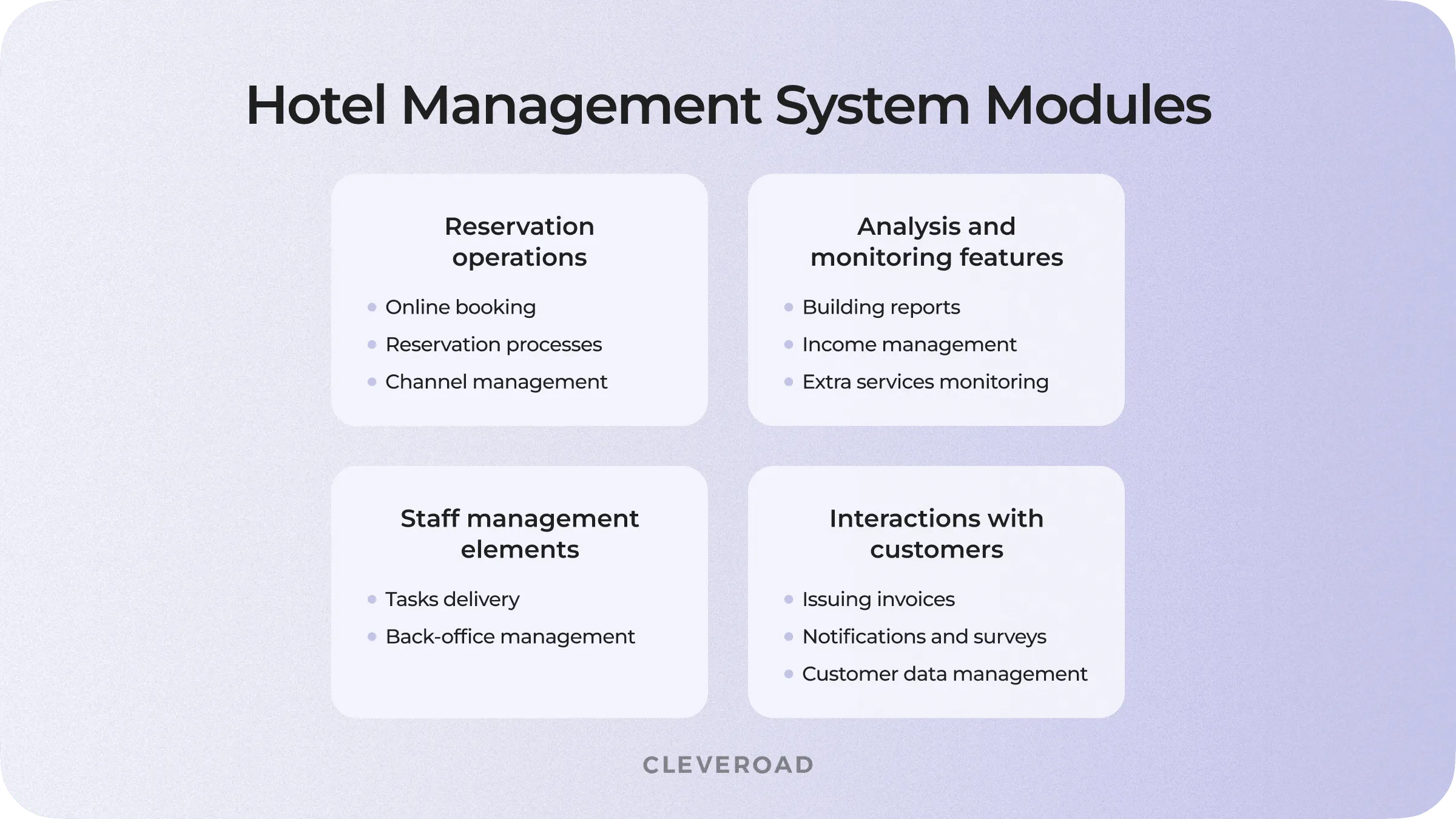
Main categories of HMS modules
Hotel Management Software Features
While customers are relaxing and having a great time, the staff have to deliver a number of errands without any delays, mistakes, and miscalculations. For this, they need swift, stable, and secure software equipped with all the necessary features.
Let’s take a look at features you might want to see in each of the modules.
Reservation operations
Guests usually start interactions with a hotel by booking a room. That’s why the reservation module should be taken seriously during hotel management software development. It adds and stores reservation details (e.g., check-in dates, room numbers, personal customer details) in a database and transfers this information to the front-desk platform so staff members can review it.
The most popular features of this module include an online booking engine, reservation means, and channel management.
1. Online booking
Example. Hilton Hotels encourage customers to book rooms directly from their website instead of using third-party distribution channels like Expedia or Booking.com.
According to the latest research, almost 700 million people will be booking rooms online by 2023. As for this year, 580 million travelers prefer online reservations over contacting hotels by phone or email. In addition, guests often book activities (pool service, Internet space, game rooms, bowling alleys, etc.) in advance on the very same website.
Despite a large number of OTA services, many hotels prefer independence and offer to book rooms directly from their website. Or they combine OTAs and booking from their site. We’re going to cover OTA services in more detail later on.
Find out how much does it cost to make a website in our detailed guide
This is how a booking engine works:
- System checks available rooms and shows possible check-in dates to users.
- As users choose a hotel room and pay for it, a confirmation letter is sent to the indicated e-mail address.
- After the completion of the operation, booking details are transferred to staff members.
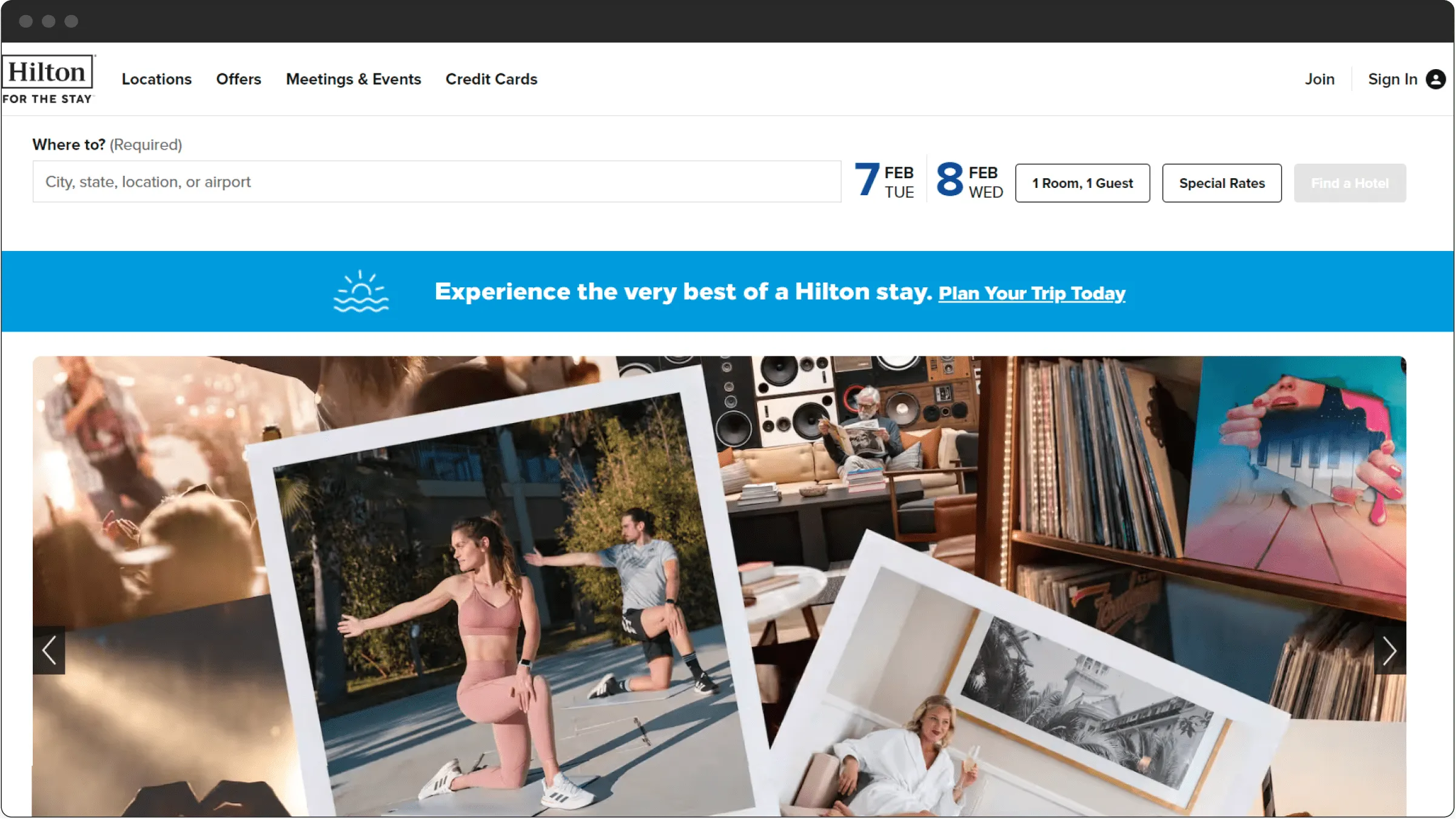
Hilton Hotels booking page
2. Reservation processes
Once a management system receives a reservation request, it marks the number of days the person stays for. This allows hotel employees to check and update room statuses, cancel registrations, and issue receipts when necessary. Finally, it helps staff with checking guests in and out, making the process automatized and saving clients’ time.
According to customers’ wishes, hoteliers can also edit reservation details: change check-in or check-out dates, book additional room services, mark preferable transportation means, and so on.
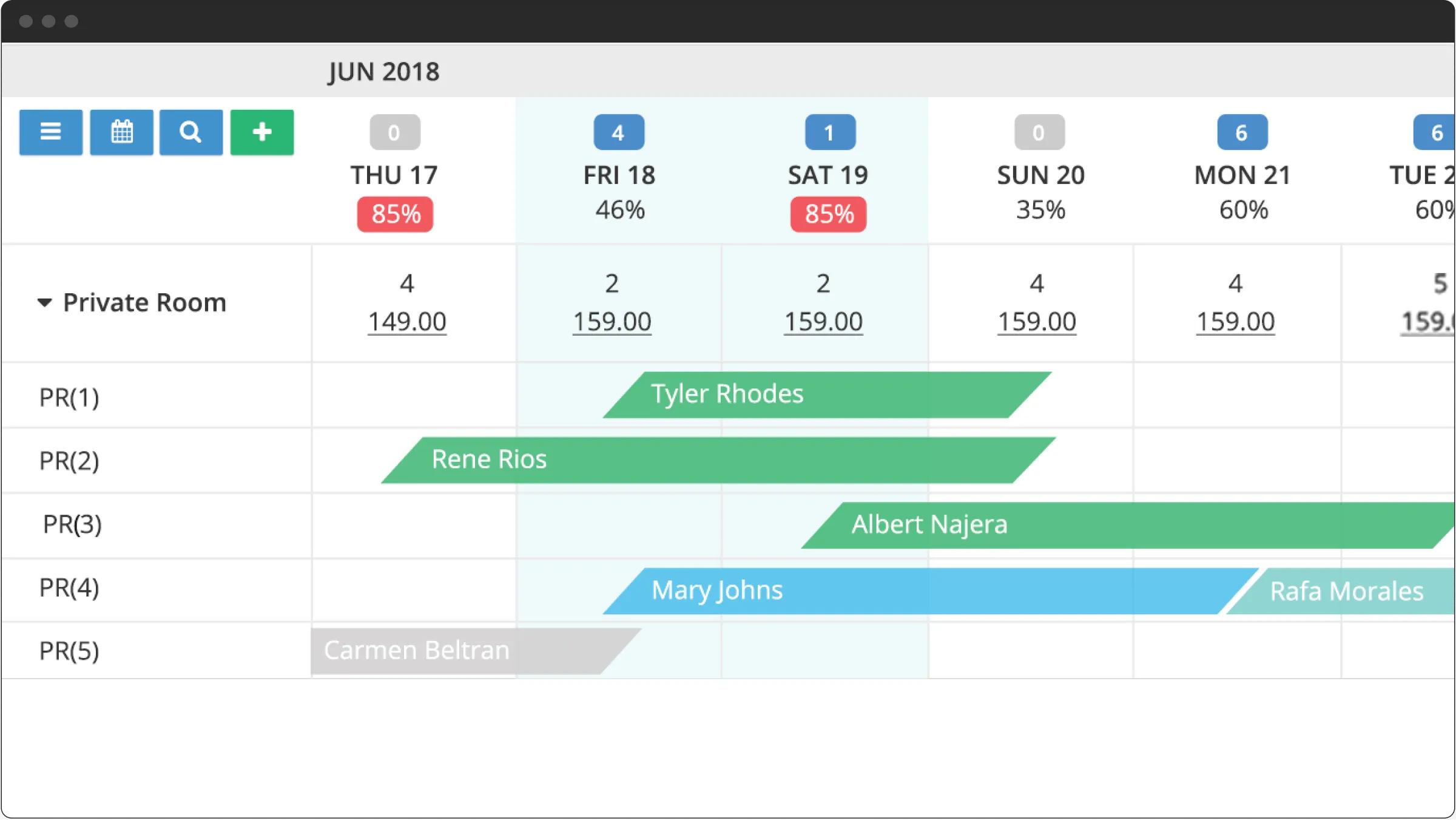
Example of a reservation dashboard in HMS
3. Channel management
Channel management is used for synchronizing inventories with various Online Travel Agencies like TripAdvisor, Booking.com, Expedia, Galileo.
To take advantage of custom hotel management software and interact with various OTAs, developers should integrate the HMS with them via APIs. Two-way API integration ensures the delivery of up-to-date information over all channels.
Additionally, to make the booking process as seamless as possible, it’s important to provide OTA partners with full access to vacancy data. So when customers use Booking.com or any other platform, they will see all available rooms and can take them.
Note that distribution agents work with a number of hotels and if your system is not running properly they may decline the partner request form your hotel. Thus, prior to sending it, make sure that your software works in a decent way and all important elements (rates, rooms availability, payment methods) are fully configured.
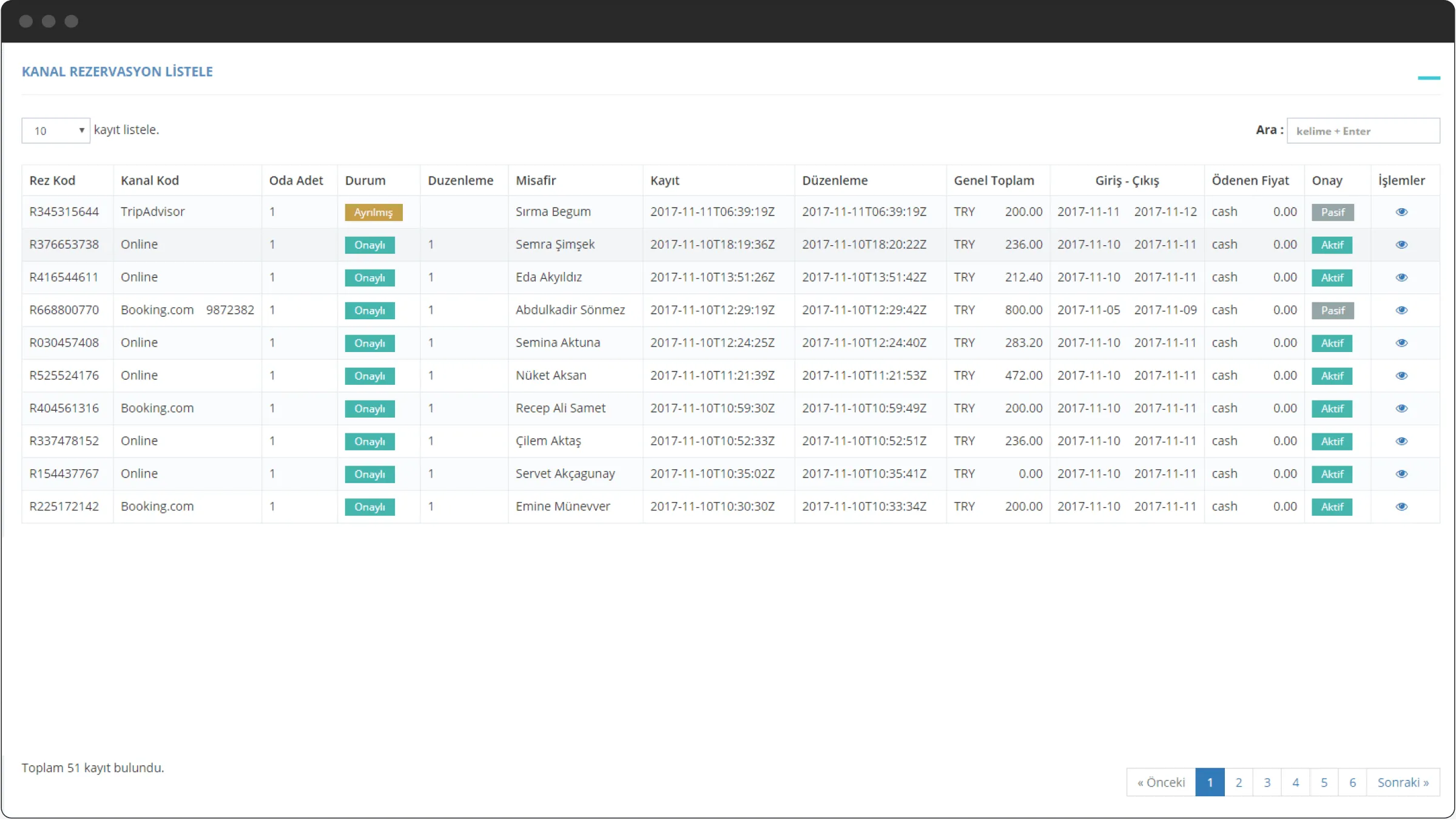
Channel management feature
Analysis & monitoring features
It doesn’t matter if the hotel employs five or five hundred staff members – there is a necessity to monitor how well they perform. Same thing with profit. Using custom-built hotel management systems allows for drawing personalized reports at the end of a specific period and keeping finances under control.
1. Income management
Revenue indicators are vital for monitoring the overall financial situation and taking action to maximize profitability. Although OTAs and showy marketing campaigns help increase revenue, it’s still essential to monitor everyday expenses and income to understand what led to gains or downfalls.
Revenue management helps monitor competitors’ prices, services, marketing campaigns, and activities. Additionally, the system considers future events and monitors the cost of hospitality services to offer the best pricing strategies.
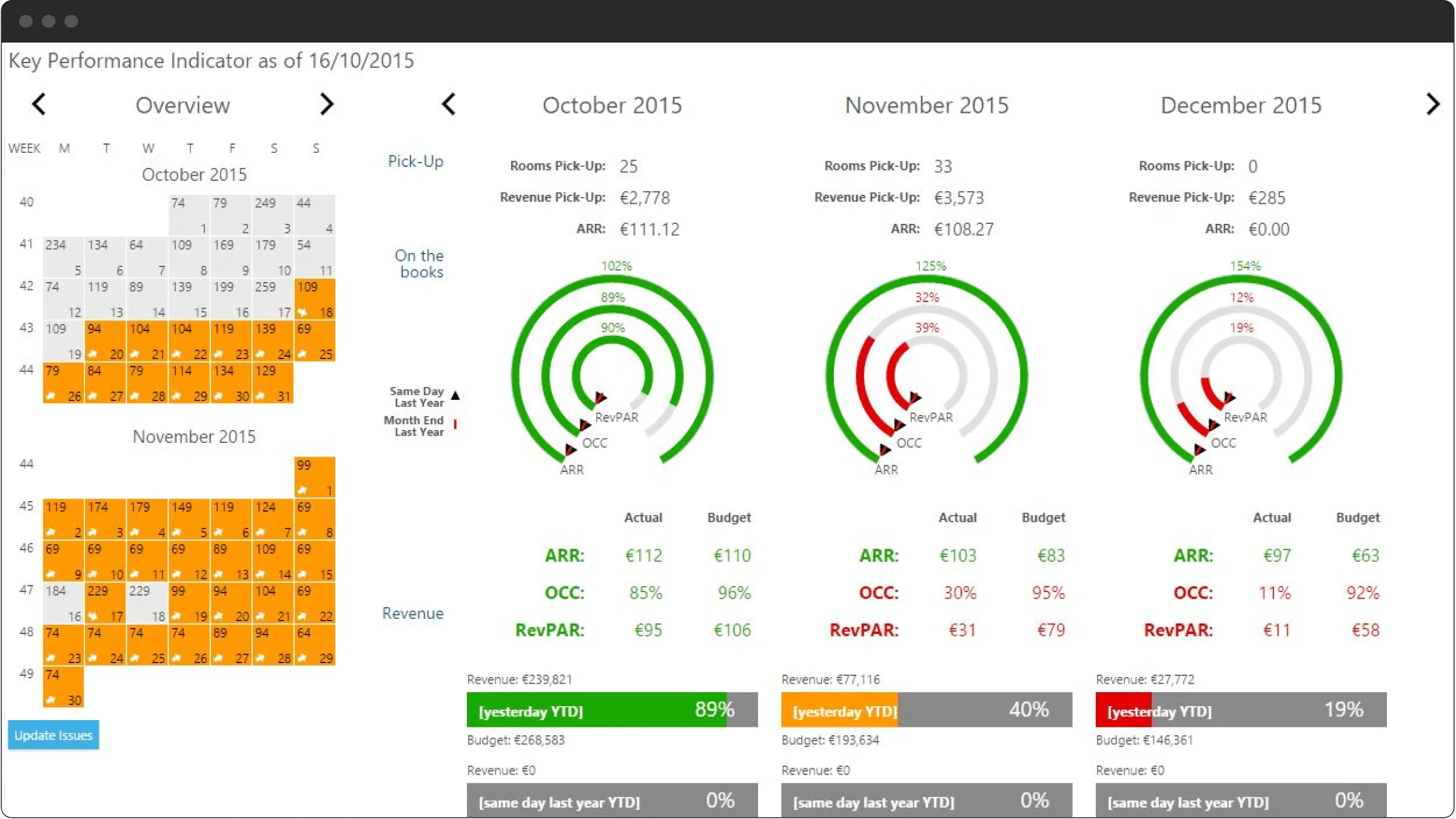
Revenue management is simple with a custom-built HMS
2. Building reports
In the end of a specific time-period, hotel management might want to collect information about staff performance, some details about their guests, data delivered by custom hotel property management system and so on.
The main advantage of this feature is that you can create any report depending on the metrics you’d like to check. For example, if the system is connected to OTAs you can understand whether the partnership is successful or it’s the right time to look for other partners elsewhere.
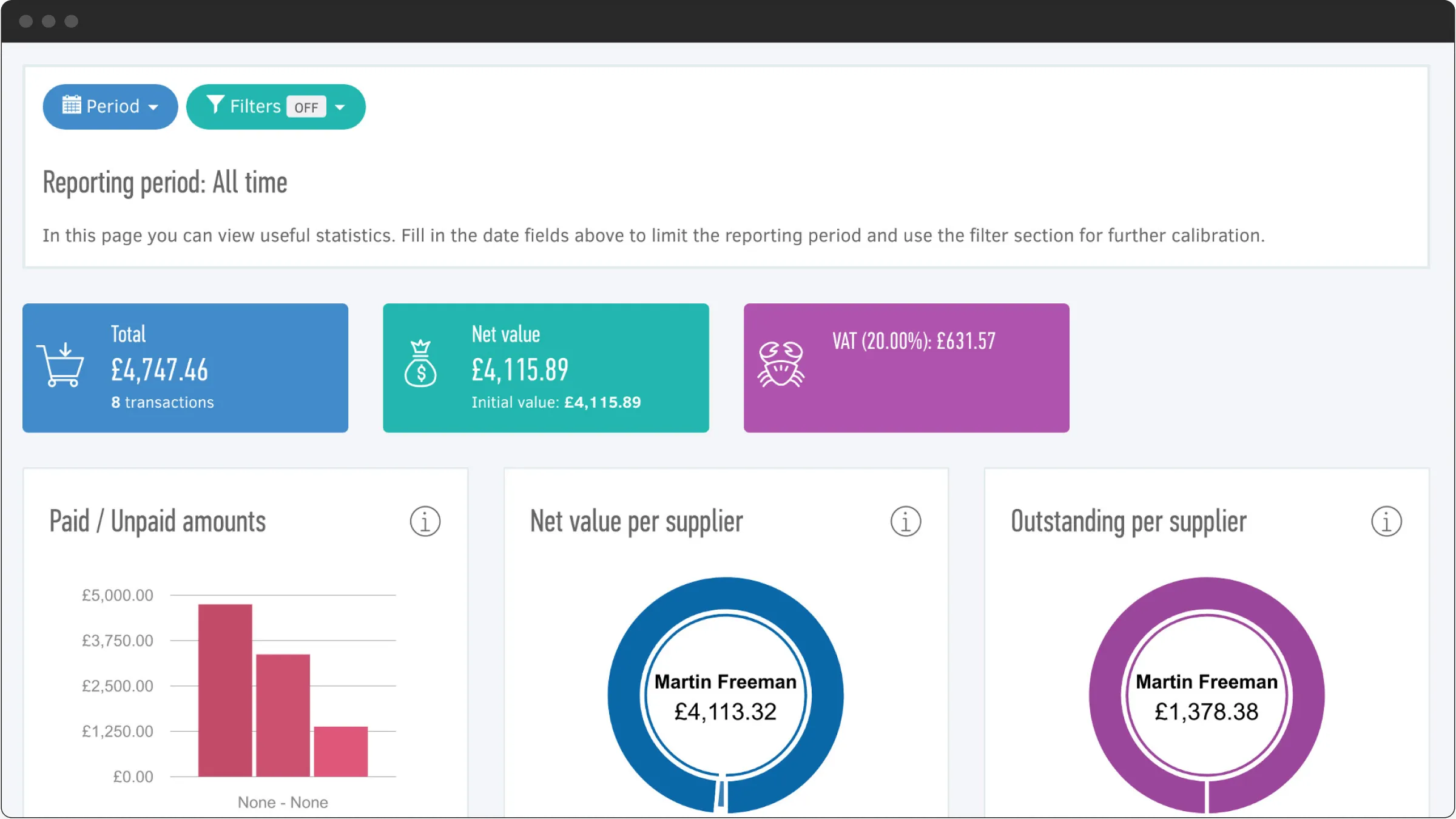
Creating reports is another use case for hotel management system
3. Extra services monitoring
Example. Pantone Hotel offers drinks, delicious breakfast and late-check out right on the booking page. Works for customers and brings additional profit to owners!
If the hotel has additional facilities (e.g. cafes or restaurants, spa-centers, swimming pool, car renting services), guests may want to try them. Extra services monitoring is an additional hotel management system feature. It’s applied for managing guests’ activities by tracking which services customers used the most and which ones generate more profit.
This is extremely useful for automatization of all transactions and for keeping them in one place. Moreover, the system can be built in a way to automatically apply all the gained discounts so hotel managers won’t need to ask customers to show a discount card. Everything can be checked right away.
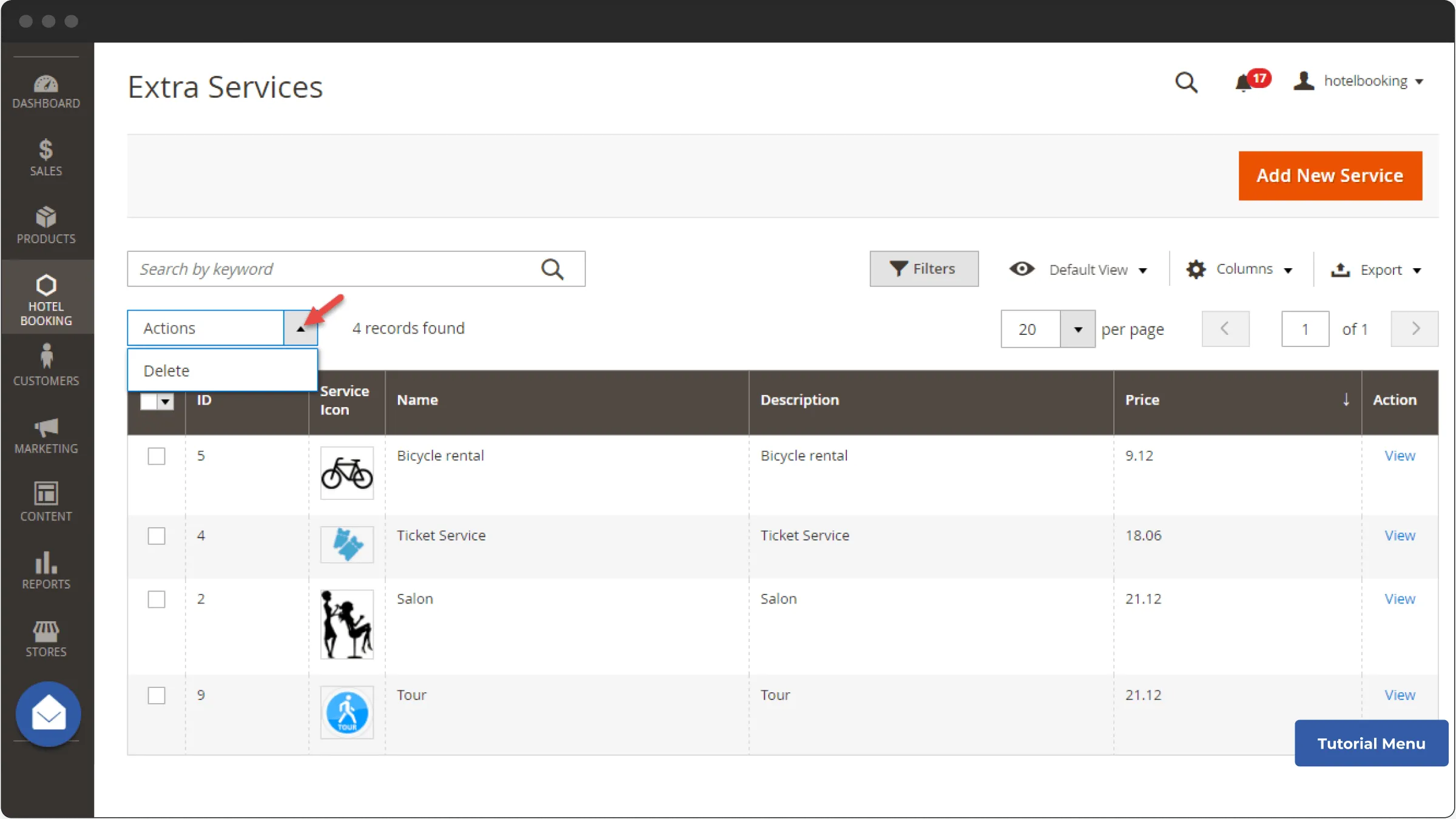
How extra services may be reflected in the software
Staff management elements
Hotel management systems not only process customers’ requests but work with internal clients too. If previously managers had to use phones to contact employees and write down what task is assigned to whom, now all that can be done in a single application with just a few clicks.
So let’s review the most important features related to staff management.
1. Tasks delivery
Example. Meliá Hotels International staff were using MS Excel to track tasks, and printed reports out on paper. Sure, there was no way to monitor latest project status in this case. That’s why they decided to switch to task management system, tracking progress, and getting real-time updates.
In order to streamline business processes, you obviously need to assign tasks to employees and track their progress. Managers can now organize the workflow way more efficiently as they don’t have to contact each person. Instead, they assign specific tasks to certain people via the application.
By using HMS, front office managers can make a list of cleaning tasks for maids to check. At the same time, the maids no longer need to wait for a ‘cleaning hour’ and can prepare rooms for next customers as soon as previous ones have checked out.
Here you can also make use of the property management system. PMS keeps the list of things that require repairing or replacement. So when staff faces an issue of a broken chair or a stolen towel, they can easily report it and come close to problem resolving in no time.
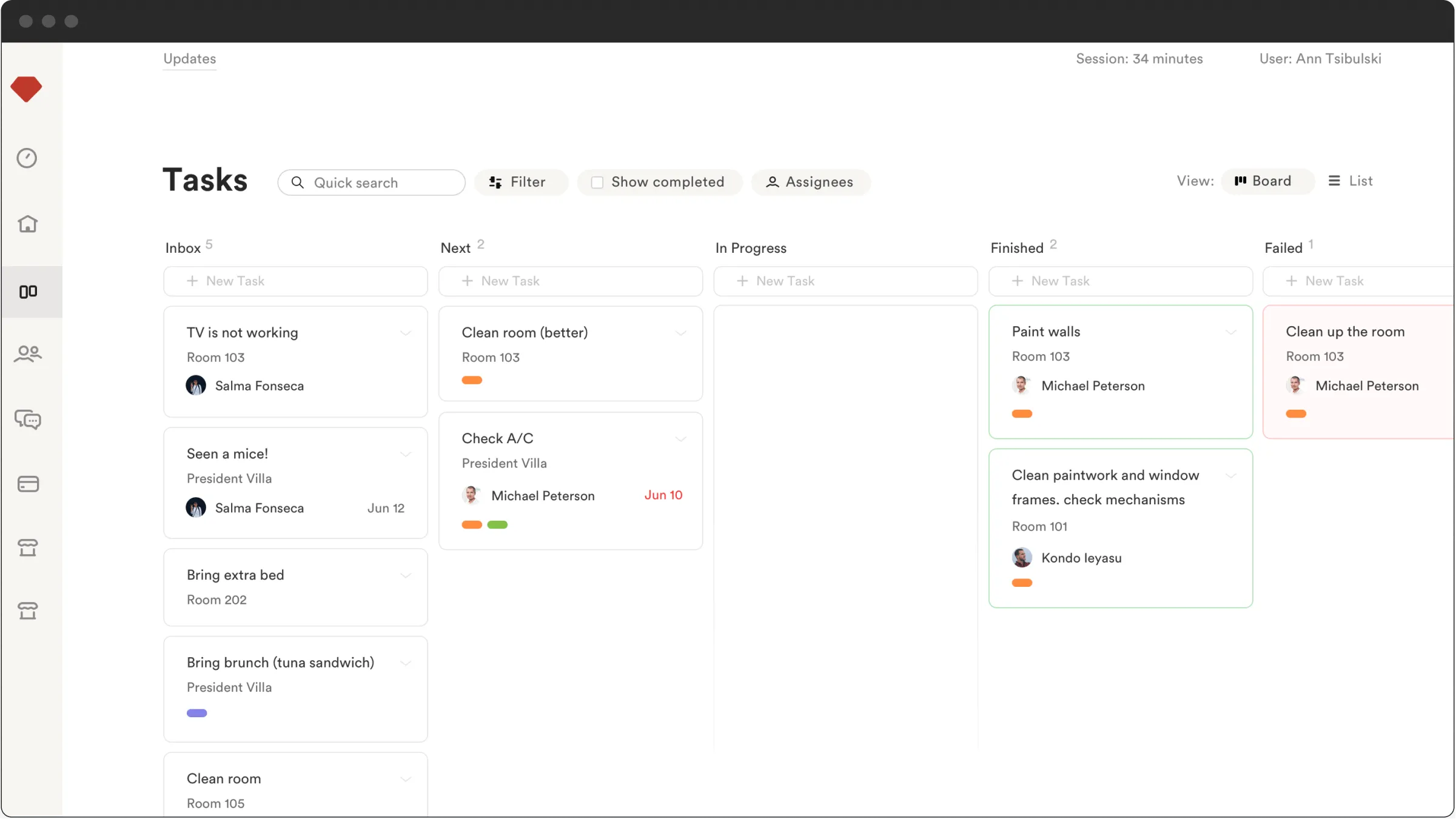
Hotel property management system example
2. Back-office management
Example. Prior to applying HR solutions, Royal Marine Hotel in Dublin had employees sign in at the reception desk, and there was no way to track their breaks, absenteeism or late comings. Using Advance Systems software, they managed to improve staff efficiency, reduce the number of errors and administrative costs.
Staff management is one of the key features of a hotel management system. As it’s possible to integrate custom HMS with staff management channels, you will always be aware of all internal interactions. Managers can easily enter information about distributed shifts, salaries, sick leaves, vacations, and days-off of employees into the database and review it when needed.
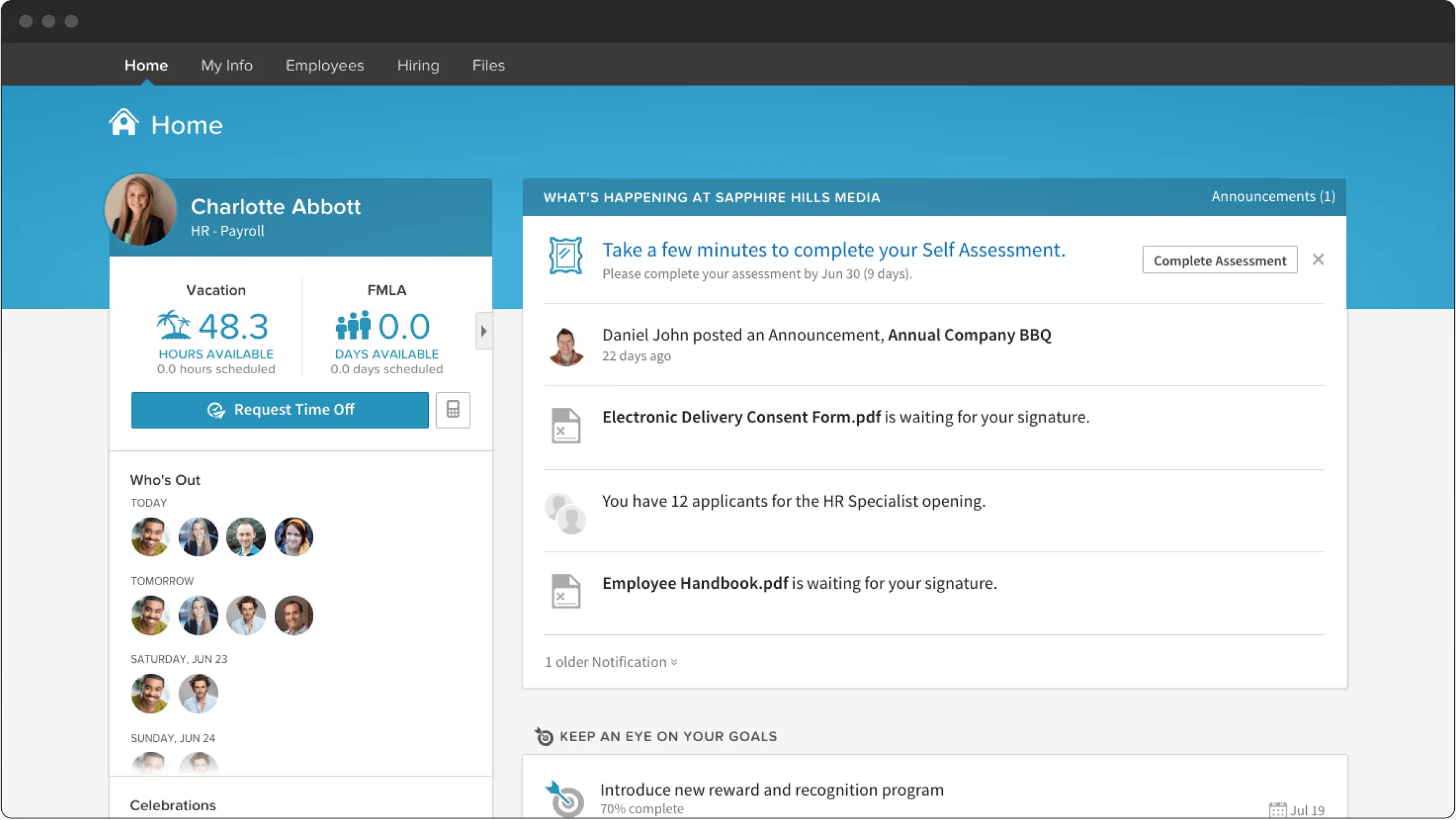
Benefits of hotel management system used by HRs
Interactions with customers
Customer interactions are important in any sphere, especially in hotel management. That’s why hearing guests’ reviews, offering new services according to their tastes and preferences, and making sure the customers are satisfied with your services are the key parts for your success. Guest relationship management is another use case of a hotel management system with a few in-built features for this purpose.
Wondering if a mobile app is also a good investment for your hotel? Read our 'Hotel booking app development' guide to make sure.
1. Customer data management
Whether guests have appeared in the hotel for the first time or are long-term clients, collecting more details about their habits, preferences, driving means, the purpose of the visit, and so on is a good idea. All this can help personalize the customer experience and offer them entertainment and services to their taste.
If a customer stays at a hotel for business trips a few times per year, information about their needs and preferences can be used the next time they book a room. It’s easy to note and pass information that customer, perhaps, needs a Wi-Fi-enabled work area, book a conference room for them, or other areas for their needs.
An elaborate hotel management system database design is key to storing all the details in one place. Thus, if you’d want to collect guests’ contact details, preferred payment methods, type of rooms booked, total spending, etc., this feature is the right choice for you.
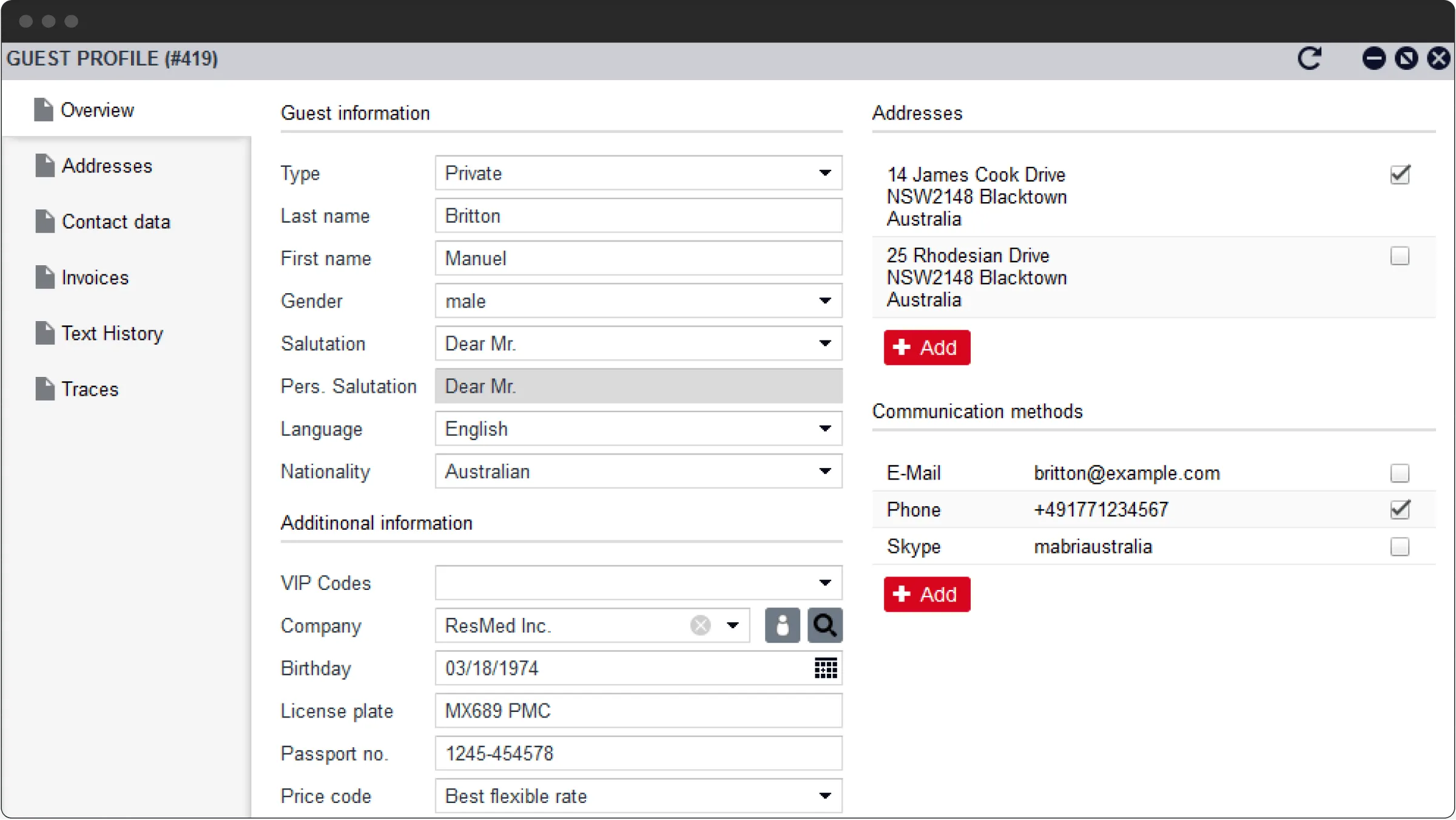
Using HMS, you can keep customer details in one place
2. Notifications and surveys
Example. Hilton staff sends email to inform subscribers about honor member accounts and their benefits reaching different audience segments. No wonder they have 70 million members enjoying the program!
Confirmation is the first thing customers expect to receive once they get over with booking and complete the payment. This is an affirmation of everything going as planned and the sign saying it’s nothing to worry about.
Being a valuable tool for communicating with customers, notifications are usually sent at all stages of their stay:
- Prior to the arrival
- During the stay
- Shortly after check-out
First, customers receive a notification regarding the booking process, payment confirmation, and list of additional services ordered.
By the way, hotels often mention the best attractions of the city, nearby cafes, places worth visiting, etc. You can also offer personal concierge app integration to enhance guests experience.
During your guests’ stay, you may inform them about best offers and discounts the hotel provides, promote extra services and give a list of the most popular dishes in the hotel restaurant.
Once the guests have checked-out, you may ask them to provide feedback by taking a survey or writing a short review.
In addition, offering a discount for the next visit is a good gesture.
3. Issuing invoices
Guests may ask for an invoice after checking-in, and it is expected to be issued fast. The custom hotel management system has to provide all the information regarding recent payments and have secure payment methods to keep all the details safe.
Looking for the most suitable payment provider? Check our ‘How To Secure Payments Processing’ guide out!
Hotel Management Software Development Process
Hotel management system development consists of several consecutive steps. Let's consider each of them in detail on the example of Cleveroad’s Software Development Life Cycle (SDLC):
1. Searching for a Technical Partner If you want your HMS to be truly effective and profitable, you should better trust its development to a professional software provider. The outsourcing market offers the widest choice of vendors today. You can explore vendors' portfolios and customer reviews to make the best choice. In addition, platforms like Clutch can help you simplify your search.
2. Solution Design Once you have chosen your software provider and contacted them, the project enters the solution design stage. The Solution Design team processes your software and preliminary information at this stage. It usually includes business analysts (BAs), Solution Architects (SA), and a designer. The team defines your corporate goals, the scope of work, basic quality attributes, etc. They also provide you with a rough estimate, team composition, and a timeline.
3. Discovery Phase The next important phase in hotel management software development is the Discovery phase. The development team turns all the solution requirements into a clear implementation plan. During this phase, the team:
- Analyzes business processes and builds relevant diagrams such as impact map, flowcharts, etc.
- Creates a detailed feature list that meets all the software requirements
- Develop design concept and UX map
- Draw up a detailed estimate of the product development costs, etc.
We sign a development contract at the end of the Discovery Phase if you agree with the numbers and conditions.
4. Development and Quality Assurance After you've agreed on all details and the team has prepared the documents, the development process starts. At Cleveroad, we adhere to the Agile methodology, namely the Scrum framework, which involves dividing the development process into 2-week sprints, during which a certain part of the functionality is created. Together with the Project Manager, you coordinate the tasks for each sprint. A quality guarantee accompanies each stage. After the hotel management software is ready, the QA engineers do the regression testing, which includes a complete test of all the features.
5. Launch and Maintenance The system can be implemented in all work processes when the hotel management software development is completely finished. Cleveroad's team always helps customers get the software up and running, integrate it with existing applications, and train staff. However, the partnership with the software provider continues. Complex projects such as the HMS need constant support and maintenance to stay ahead of the competition. It may include system updates, functionality extensions, bug fixing, etc.
Technology Stack and Development Team
As we already know what features we need to pay attention to during custom hotel management system development, it’s high time to check what technologies are used for delivering the software and who is working on its performance and UI design.
Tech stack for hotel management system designing:
Back-end development tools
- Language: JavaScript, Node.js
- Framework: Express
- Database: MySQL
- API documentation: Swagger
- Infrastructure: AWS
Front-end development tools
- Language: TypeScript
- Framework: Angular
Members of a development team
- Business Analyst
- Project Manager
- UI/UX designer
- Front-end developer
- Back-end developer
Please keep in mind that the aforementioned list of tools is approximate and the final list may differ according to your objectives, features added and so on.
How Much It May Cost to Build a Custom Hotel Management Software
The cost of software development for hotel management can vary depending on many factors. One of the key ones is the number and complexity of features. However, in order to help you with this complex estimation, our specialists have calculated the approximate cost of each feature implementation.
| Features | Approx time (hours) | Approx cost ($) |
Online booking | 80 - 120 | 4000 - 6000 |
Reservation processes | 100 - 140 | 5000 - 7000 |
Channel management | 120 - 160 | 6000 - 8000 |
Income management | 120 - 160 | 6000 - 8000 |
Building reports | 80 - 120 | 4000 - 6000 |
Extra services monitoring | 180 - 220 | 9000 - 11000 |
Tasks delivery | 80 - 120 | 4000 - 6000 |
Back-office management | 120 - 160 | 6000 - 8000 |
Customer data management | 100 - 140 | 5000 - 7000 |
Notifications and surveys | 30 - 70 | 1500 - 3500 |
Issuing invoices | 100 - 140 | 5000 - 7000 |
Total | 1110 - 1550 | 55500 - 77500 |
Please note that the estimate above is approximate and based on primary features only. It doesn’t include the cost of an admin panel, 3rd-party integrations, design services, QA, DevOps, and project management. They should be priced separately. Feel free to contact our Senior Business Analysts for a detailed estimate of your solution for hotel management.
Another important factor determining the price is the hourly rate in the region you choose for cooperation. Our estimate is based on a $50/hour typical for our region (Northern Europe, Estonia). Let's look at how the cost of HMS development may vary depending on the area:
- Northern Europe and CEE region: $55,000 - $77500 ($50 per hour)
- Western Europe: $111000 - $155000 ($100 per hour)
- US and Canada: $166500 - $232500 ($150 per hour)
- India: $33,300 - $4,6500 ($30 per hour)
Hotel Software Development With Cleveroad
Cleveroad is a software development company headquartered in Northern Europe, Estonia. Our team completed many successful projects, including booking platforms, HMS, and TMS software solutions for the hospitality and tourism industry. These solutions allow large and small businesses to optimize hotel management, improve business efficiency, and meet customer service expectations.
One of the examples of a digital solution for the travel industry that our team has created recently is an online platform for tourists and travel providers that allows users to find the activity or property fitting their needs. Our developers were challenged to build a digital environment for consumers and providers of tourism services that could bring simplicity, fairness, and value into consumers' choices. To meet the customer's needs, our team:
- Created a travel web platform from scratch. It included three core components: the User side, the Seller side, and the Platform Admin side.
- Implemented unique ranking algorithms. They allow travelers to calculate the Personal Value (PV) score so users can receive the most relevant results.
- Added advanced features for booking. So, after a user makes a reservation, the offer automatically becomes unavailable on all sites where it was placed.
- Provided a secure payment gateway. Thanks to the integration of Stripe, users can pay with Vis, MasterCard, American Express Credit Card, Google Pay, and Apple Pay, as well as Alipay, WeChat Pay, and other payment methods.
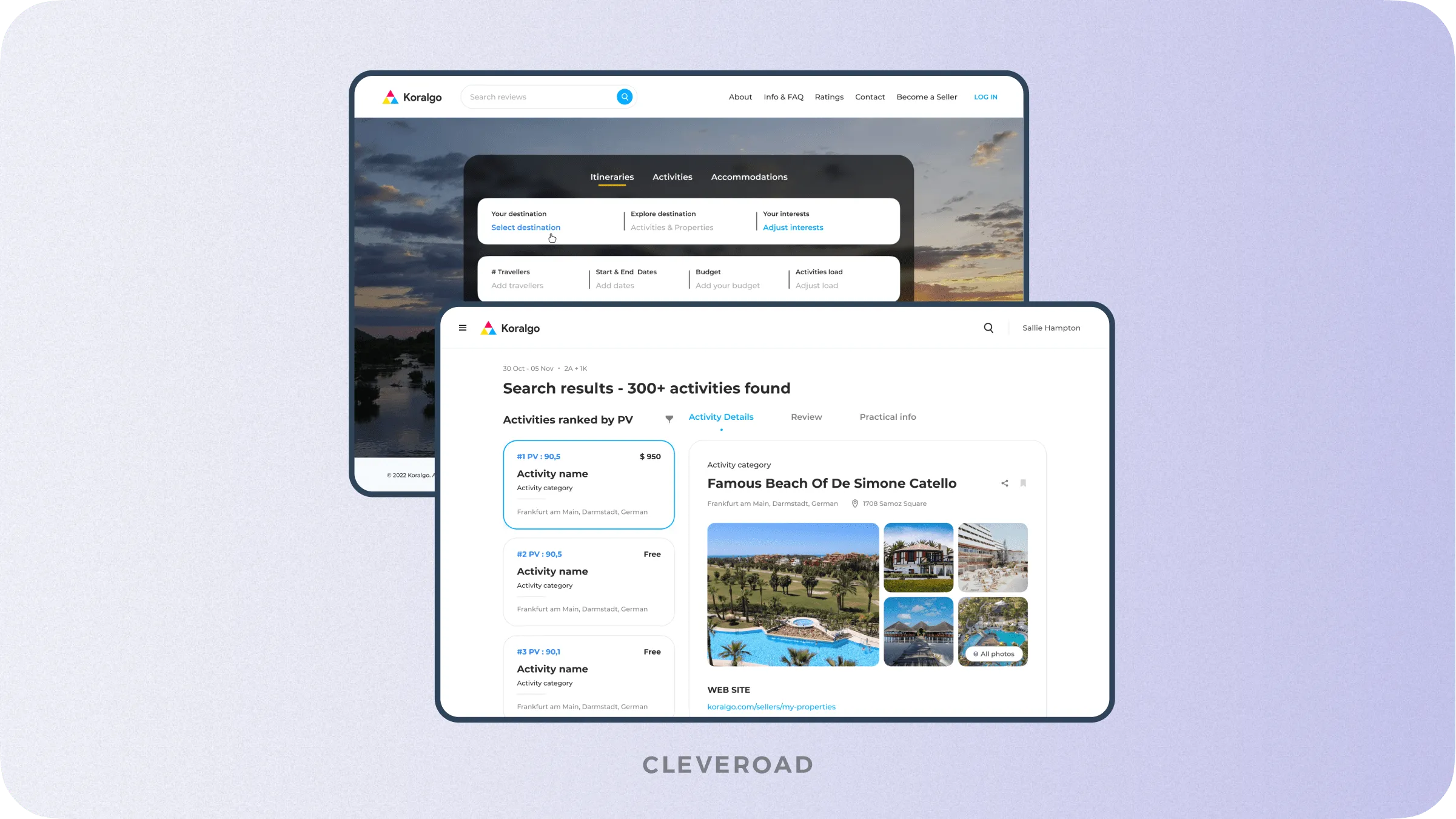
Web platform for tourists and hotel owners designed and developed by Cleveroad
As a result, our client got:
- Web platform with unique searching algorithms. It allows users to get the most relevant search results that increase the platform’s customer satisfaction rate.
- Functionality that reveals the customer's USP. The platform shows the company's unique selling proposition, increasing its competitiveness.
- A solution to attract investors. Started as a Minimum Viable Product that demonstrates the advantages of our client's offer, the platform already has several business partners.
Optimize hotel operations with HMS
Our specialists will create a system that will help you to increase hotel's productivity and profits
A hotel management system helps a hotel or a group of hotels take care of booking reservations, check-ins/check-outs, managing room rates, billing, etc.
HMS is usually split into modules:
- Reservation operations (features: online booking, reservations, channel management)
- Analysis/monitoring (income management, reporting, extra services monitoring)
- Housekeeping (tasks delivery, back-office management)
- Customer relationship management (customer data management, notifications & surveys, issuing invoices)
The total cost depends on your requirements, number of features, UI/UX design, etc.
To create the solution we've described, developers need ~1,110 hours. The average hourly rate in our country (Ukraine, Eastern Europe) is $50 per hour.
Thus, the development will cost approximately $55,500 (not including QA, design, PM & DevOps time).
Property management solutions (PMS) are must-haves for large hotels or hotel chains. They're targeted to make customer interactions more convenient and improve the working conditions of both managers and employees.
For example, a PMS can keep a list of things that require repairing or replacement. When the staff faces a broken chair or a stolen towel, they can easily report it and come close to problem resolution in no time.

Evgeniy Altynpara is a CTO and member of the Forbes Councils’ community of tech professionals. He is an expert in software development and technological entrepreneurship and has 10+years of experience in digital transformation consulting in Healthcare, FinTech, Supply Chain and Logistics
Give us your impressions about this article
Give us your impressions about this article
Comments
1 commentsI'm greatfull i found this article, thank you for taking your time to write it.